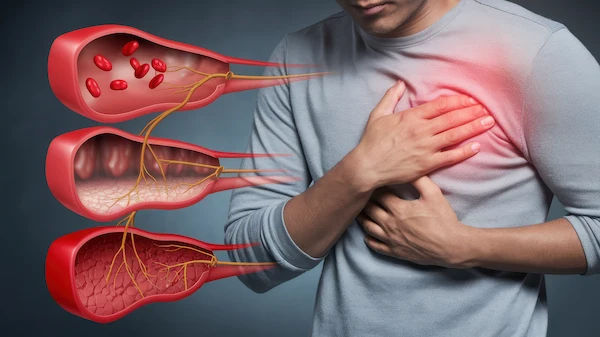Understanding Allergic Shock and Reactions
Understand the critical differences between mild allergic reactions and severe, life-threatening allergic shock (anaphylaxis). Learn to recognize symptoms, identify causes, and know the vital first aid steps for immediate intervention.

Written by Dr. Dhankecha Mayank Dineshbhai
Reviewed by Dr. Vasanthasree Nair MBBS
Last updated on 4th Aug, 2025

Introduction
Allergic reactions can range from mild discomfort to lifethreatening emergencies. One of the most severe forms is allergic shock (anaphylaxis), which requires immediate medical attention. If you or someone you know has allergies, understanding how to recognize and manage these reactions can be lifesaving.
What is an Allergic Reaction?
An allergic reaction occurs when your immune system overreacts to a harmless substance (allergen), treating it as a threat. Common allergens include:
Foods (peanuts, shellfish, eggs, milk)
Insect stings (bees, wasps)
Medications (penicillin, aspirin)
Latex
Pollen, dust mites, or pet dander (usually causing milder reactions)
When exposed to an allergen, your body releases chemicals like histamine, leading to symptoms.
Symptoms of Allergic Reactions
Symptoms can vary from mild to severe:
Mild to Moderate Reactions
Skin rash, itching, or hives
Swelling of the lips, face, or eyes
Runny nose, sneezing
Stomach pain, nausea, or vomiting
Consult Top Specialists for Personalised Tips
Severe Reaction (Anaphylaxis/Allergic Shock)
This is a medical emergency and requires immediate treatment. Symptoms include:
Difficulty breathing or wheezing
Swelling of the throat/tongue
Sudden drop in blood pressure (feeling faint, dizzy)
Rapid or weak pulse
Confusion or loss of consciousness
If you notice these signs, call emergency services (or 108 in India) right away.
What Causes Allergic Shock?
Anaphylaxis happens when the immune system floods the body with chemicals, causing a sudden and severe reaction. Common triggers:
1. Food Allergies – Peanuts, tree nuts, shellfish, eggs, and milk are frequent culprits.
2. Insect Stings – Bee or wasp venom can trigger severe reactions.
3. Medications – Antibiotics (like penicillin), pain relievers, or anesthesia.
4. Latex – Found in gloves, balloons, or medical devices.
5. Unknown Causes (Idiopathic Anaphylaxis) – Sometimes, the trigger isn’t clear.
How to Manage Allergic Reactions?
For Mild Reactions
Antihistamines (like cetirizine or diphenhydramine) can help reduce itching and rashes.
Cold compress for swelling.
Avoid scratching to prevent worsening the rash.
For Severe Reactions (Anaphylaxis)
Use an Epinephrine AutoInjector (EpiPen) – If prescribed, inject it into the thigh immediately.
Call Emergency Services – Even if symptoms improve, followup care is crucial.
Lie Down & Raise Legs – Helps maintain blood flow if blood pressure drops.
Avoid Standing or Walking – This can worsen shock.
Prevention Tips
1. Know Your Triggers – Get tested for allergies if you suspect a reaction.
2. Carry an EpiPen – If you have a history of severe allergies, always keep emergency medication.
3. Read Food Labels – Check for allergens in packaged foods.
4. Wear a Medical Alert Bracelet – Helps others know about your allergy in emergencies.
5. Inform Friends & Family – Ensure they know how to help during a reaction.
When to See a Doctor?
Consult an allergist if:
You’ve had a severe allergic reaction before.
You experience frequent mild reactions.
You need allergy testing to identify triggers.
Book an Allergy Test or Consultation
If you suspect allergies, getting tested can help prevent future reactions. You can schedule an allergy test or consult a specialist through Apollo 24|7 for expert guidance.
Final Thoughts
Allergic reactions can be scary, but knowing how to recognize and respond to them makes a big difference. If you or a loved one has severe allergies, always be prepared with emergency medication and an action plan. Stay informed, stay safe!
Would you like to book an allergy test or speak to a doctor? Visit Apollo 24|7 today for expert care.
Consult Top Specialists
Consult Top Specialists for Personalised Tips

Dr Syed Mateen Pasha
General Physician
2 Years • MBBS
Bengaluru
PRESTIGE SHANTHINIKETAN - SOCIETY CLINIC, Bengaluru

Dr. Syed Ismail Ali
General Practitioner
7 Years • MBBS
Hyderabad
Apollo 24|7 Clinic, Hyderabad

Dr. Sandhya Chandel
General Physician/ Internal Medicine Specialist
16 Years • MBBS, MD (Int. Med.), IDCCM
Bilaspur
Apollo Hospitals Seepat Road, Bilaspur
(100+ Patients)

Dr. Mohamed Azeem
General Physician/ Internal Medicine Specialist
2 Years • MBBS,MD(Internal Medicine) CCEBDM
Karaikudi
Apollo Hospitals Karaikudi, Karaikudi

Dr. Bhukya Pavan Kalyan
General Physician
5 Years • MBBS DNB Paediatrics
Bengaluru
PRESTIGE SHANTHINIKETAN - SOCIETY CLINIC, Bengaluru
Consult Top Specialists

Dr Syed Mateen Pasha
General Physician
2 Years • MBBS
Bengaluru
PRESTIGE SHANTHINIKETAN - SOCIETY CLINIC, Bengaluru

Dr. Syed Ismail Ali
General Practitioner
7 Years • MBBS
Hyderabad
Apollo 24|7 Clinic, Hyderabad

Dr. Sandhya Chandel
General Physician/ Internal Medicine Specialist
16 Years • MBBS, MD (Int. Med.), IDCCM
Bilaspur
Apollo Hospitals Seepat Road, Bilaspur
(100+ Patients)

Dr. Mohamed Azeem
General Physician/ Internal Medicine Specialist
2 Years • MBBS,MD(Internal Medicine) CCEBDM
Karaikudi
Apollo Hospitals Karaikudi, Karaikudi

Dr. Bhukya Pavan Kalyan
General Physician
5 Years • MBBS DNB Paediatrics
Bengaluru
PRESTIGE SHANTHINIKETAN - SOCIETY CLINIC, Bengaluru




